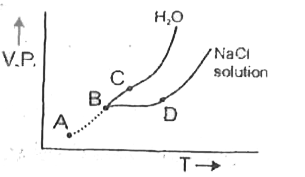The freezing point of solution is ……..than the freezing point of pure solvent.
To solve the question regarding the freezing point of a solution compared to that of a pure solvent, we can follow these steps:
1. Understanding the Concept of Freezing Point:
- The freezing point of a substance is the temperature at which it changes from a liquid to a solid. For pure substances, this is a specific temperature.
Hint: Remember that the freezing point is where the solid and liquid phases are in equilibrium.
2. Defining a Solution:
- A solution is a homogeneous mixture of two or more substances, typically consisting of a solute (the substance dissolved) and a solvent (the substance doing the dissolving).
Hint: Identify the components of a solution: solute and solvent.
3. Effect of Adding a Non-Volatile Solute:
- When a non-volatile solute (a solute that does not vaporize) is added to a solvent, it disrupts the ability of the solvent molecules to form a solid structure. This results in a decrease in the vapor pressure of the solvent.
Hint: Think about how solute particles interfere with the solvent's ability to freeze.
4. Understanding Freezing Point Depression:
- The addition of a solute lowers the freezing point of the solvent. This phenomenon is known as freezing point depression. It occurs because the solute particles interfere with the formation of the solid phase.
Hint: Recall that the presence of solute particles requires a lower temperature for the liquid to solidify.
5. Conclusion:
- Therefore, the freezing point of a solution is always lower than the freezing point of the pure solvent.
Final Answer: The freezing point of the solution is lower than the freezing point of the pure solvent.
- The freezing point of a substance is the temperature at which it changes from a liquid to a solid. For pure substances, this is a specific temperature.
- A solution is a homogeneous mixture of two or more substances, typically consisting of a solute (the substance dissolved) and a solvent (the substance doing the dissolving).
- When a non-volatile solute (a solute that does not vaporize) is added to a solvent, it disrupts the ability of the solvent molecules to form a solid structure. This results in a decrease in the vapor pressure of the solvent.
- The addition of a solute lowers the freezing point of the solvent. This phenomenon is known as freezing point depression. It occurs because the solute particles interfere with the formation of the solid phase.
- Therefore, the freezing point of a solution is always lower than the freezing point of the pure solvent.
Topper's Solved these Questions
- BOOK - CENGAGE CHEMISTRY ENGLISHCHAPTER - SOLUTIONSEXERCISE - Exercise (True/False)19videos
SOLUTIONS
- BOOK - CENGAGE CHEMISTRY ENGLISHCHAPTER - SOLUTIONSEXERCISE - Exercises Archives (Linked Comprehension)3videos
SOLUTIONS
- BOOK - CENGAGE CHEMISTRY ENGLISHCHAPTER - SOLUTIONSEXERCISE - Exercise (Interger)8videos
SOLUTIONS
- BOOK - CENGAGE CHEMISTRY ENGLISHCHAPTER - SOLID STATEEXERCISE - Ex 1.2 (Objective)9videos
SOLID STATE
- BOOK - CENGAGE CHEMISTRY ENGLISHCHAPTER - SURFACE CHEMISTRYEXERCISE - Archives Subjective2videos
SURFACE CHEMISTRY
Similar Questions
The freezing point of solution is ……..than the freezing point of pure solvent.
View SolutionThe boiling point of solution is ……..than the boiling point of pure solvent.
View Solution
Freezing point of solution is marked asView SolutionFreezing point of a solution is smaller than freezing point of a solvent. It is due to :
View SolutionSolution with highest freezing point is
View SolutionThe freezing point of the H2O is :
View SolutionPure water freezes at 273 K and 1 bar. The addition of 34.5 g of ethanol to 500 g of water changes the freezing point of the solution. Use the freezing point depression constant of water as 2 K kgmol−1. The figures shown below represent plots of vapour pressure (V.P.) versus temperature (T). [molecular weight of ethanol is46gmol−1 Among the following, the option representing change in the freezing point is
View SolutionA 10% solution (by mass) of sucrose in water has freezing point of 269.15 K. Calculate freezing point of 10% glucose in water, if freezing point of pure is 273.15 K (Given molar mass of sucrose= 342 g mol−1, Molar mass of glucose =180 g mol−1).
View SolutionAt freezing point of a solution there is always
View SolutionThe freezing point of 4% aqueous solution of 'A' is equal to the freezing point 10% aqueous solution of 'B'. If the molecular mass of 'A' is 60, then the molecular mass of 'B' will be:
View Solution
